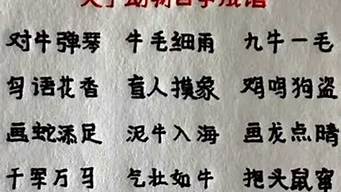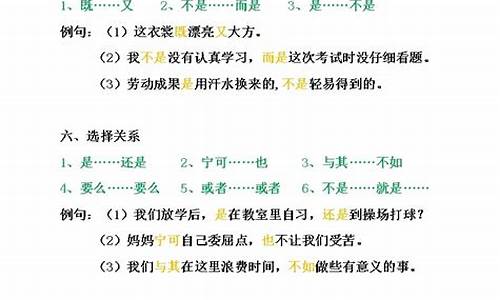everyone_everyone后面跟三单吗
1.英语:everybody,everyone,anybody,anyone区别?
2.everyone的近义词是什么
3.someone,anyone,everyone有什么不同
4.everyone后面加什么

系统中除了6个默认权限分组,系统还存在一些特殊权限成员,这些成员是为了特殊用途而设置,分别是:SYSTEM(系统)、Everyone(所有人)、CREATOR OWNER(创建者)等,这些特殊成员不被任何内置用户组吸纳,属于完全独立出来的账户,Everyone(所有人)的账号权限赋予的是所有人的权限,是系统默认的用户账户之一。
英语:everybody,everyone,anybody,anyone区别?
everyone是第三人称单数。
例句:Everyone is here.
Everyone likes drinking water.
除此之外,第三人称单数还有:
1、人称代词he / she /?it作主语
2、单个人名、地名或称呼作主语
3、单数可数名词或"this / that / the+单数可数名词"作主语
4、不定代词someone, somebody, nobody, everything, something等及指示代词this, that作主语
5、不可数名词作主语
扩展资料:
第三人称单数是英语中的一种语法,也称“三单”或“单三”,用于一般现在时的句子,当动词在第三人称后时:
第三人称单数是语言中对对话双方外其它某一个人指示时使用的代词(简称三单)。
第三人称是相对于对话时,某一句话中,言语发出方(第一人称)和言语的听受方(第二人称)以外的其它人称。
单数是指该句中提到的其它人是一个人,相对于两个人(双数,在太平洋岛屿土著语言中广泛存在人称代词的双数)或更多人(复数)。
百度百科-第三人称单数
everyone的近义词是什么
这个问题我会,虽然本人英语口语不是很好,但是对英语四六级词汇还是很熟悉的~给大家总结了一个表格可以先粗略看一下:
含义
1、everybody 英[?evrib?di],美[?evribɑ?di]?
pron. (某个群体中的)每个人;所有人;人们;
2、everyone 英[?evriw?n],美[?evriw?n]
pron. 每个人;人人;所有人;每人;
3、anybody 英[?enib?di],美[?enibɑ?di]?
pron. (用于疑问句、条件从句)任何人;同anyone;
n. 重要人物;平常人;
4、anyone 英[?eniw?n],美[?eniw?n]?
pron. (用于否定句、疑问句,也用于if或whether之后,或紧接prevent、forbid、avoid等动词,代替someone)任何人;随便哪个人;重要人物;
用法
1、everybody则指“每个人”,着重于“整体”。
Everybody should do good self work.
每人必须做好自己的工作。
It is difficult to find a time that suits everybody.
很难找到一个对每人都合适的时间。
The rascal was hated by everybody in the village.
这坏蛋,村子里人人痛恨。
2、everyone等于everybody,意思是“每个人”,不指具体哪个人,而是强调整体。作主语时,一般与单数谓语动词连用,但在俗语中,谓语动词有时也用复数。
The ruling was not fair to everyone.
这项裁决并非对每人都公正。
Everyone should be guarded by legal barricades.
人人都应受法律保障。
The justice of these remarks was clear to everyone.
人人都明白这些话是公正的。
3、anybody多用在疑问句、否定句和条件句中,意为“某人”“任何人”;也可用于肯定句中,意思是“随便哪个人”。anybody不指物。
Anybody anything more to say?
还有谁有话要讲?
Is there anybody who can tell a fairy tale?
有人能讲童话故事吗?
Did Mr. Golspie leave any message for anybody ?
戈尔斯培先生给谁留下口信了?
4、anyone指“任何人”,不指“任何一个”,any one指“任何一个”,但是有时也指“任何人”,现在比较不普遍那样说。
We dislike to have anyone patronize us.
我们不喜欢任何人对我们以恩人自居。
She never heeded anyone's warning.
她从不理会任何人的警告。
Has anyone got a pen?
有人带笔了吗?
someone,anyone,everyone有什么不同
everyone的近义词:everybody?
读法:英 ['evr?b?d?] ?美 ['?vr?bɑdi]?
释义:pron. 每个人;人人
Everybody understands每个人都明白
everybody else其他人
Everybody Peple每个人
Everybody Say有我常赖着你
例句:
1、Everybody likes to join in this activity.
每个人都愿意参加这一活动。
2、Everybody has his own merits and demerits. One should never think that he is perfect while others are all good for nothing.
每个人都有自己的优点和缺点,不要把别人都看成百无一是, 把自己看成十全十美。
扩展资料
everyone的反义词:nobody?
读法:['n?b?d?]?
释义:
1、pron. 无人,没有人;没有任何人
2、n. 无名小卒;小人物
短语:
1、A nobody无名小卒?
2、Nobody cares没有人关心
3、Nobody loves没有人爱?
4、nobody excepted无一人例外
5、Nobody understands没人能够理解
everyone后面加什么
一、everyone
n. 每个人 pron. 每人,人人
例句与用法:
1. In a small village, everyone knows everyone else.在一个小村庄里,人人皆相识。
2. Not everyone likes this book.并不是每个人都喜欢这本书。
3. Everyone should do his part.每人都应尽他的本分。
4. After these dry days, everyone hopes for rain.干燥的天气之后,人人都希望下雨。
5. His coarse manners shocked everyone.他的粗鲁的举止使每个人震惊。
6. Everyone has the right to live in his own way.每人都有权按自己的方式生活。
7. We adhere to the principle that everyone should be treated fairly.我们必须坚持人人都应该被平等对待这一原则。
8. Everyone should obey the ordinance.每个人都必须遵守这条政府法令
二、someone
pron. 某人,有人
例句与用法:
1. Someone has to lock up the house.总要有人把房子锁起来。
2. I remember feeling that God, or someone, had brought us together.我记得感到上帝或某人把我们凑合在一起。
3. I felt someone twitch at my coat.我感到有人猛地拉我的上衣。
4. A proposal to drink to someone or something or a speech given before the taking of such a drink.祝酒为某人或某物而干杯的建议或喝这种酒以前的一个讲话
5. Someone believes that a baby's urine is a kind of medicine.有人相信婴儿的尿是一种药。
6. Someone in the audience began to laugh.观众中有人开始笑起来。
7. Since you can't answer the question, perhaps we'd better ask someone else.既然你无法回答这个问题,我们最好再问问别人。
8. Someone tried to poison our dog.有人想毒杀我们的狗。
三、anyone
pron. 任何人
例句与用法:
1. You shouldn't trust anyone strange.你不应相信任何陌生人。
2. It can happen to anyone.这事可能发生在任何人身上。
3. Anyone swimming in this lake does so at his own risk.任何人在此湖中冒险游泳,其后果自负。
4. Anyone with an annual income of under 5000 may be eligible to apply.凡年收入在5000英镑以下者均可申请。
5. Anyone touching that wire could get badly shocked.任何人碰到那根电线都会遭到严重的电击。
6. I forbid you to tell anyone.我不许你告诉任何人。
7. John is more diligent than anyone else in his class.约翰比班上其他的同学用功。
8. He was too shy to talk to anyone at the party.在晚会上他很腼腆,没有和任何人讲话。
四、no one:
pron. 没有人(谁也不)
例句与用法:
1. No one knows outside two or three persons.除两三个人外谁也不知道。
2. He walked along in the shadows hoping no one would recognize him.他走在暗处,希望没有人认出他来。
3. No one can remain youthful forever.没有人能永保青春。
4. No one doubts her competence as a teacher.谁也不怀疑她能胜任教师工作。
5. There was a traffic accident in this street, but no one was harmed.这街上发生了交通事故,但没有人受伤。
6. No one knows what will happen next.谁也不知道下一步有什麽事。
7. No one could understand the little baby's babble.没人能听懂这个小婴孩的话。
8. Nowadays no one will challenge the fact that the earth is round.现在没有人会对地球是圆的这一事实提出异
五、none
ad. 一点也不 prep. 没人,毫无 pron. 没有人,没有任何东西
例句与用法:
1. None of the money is mine.这些钱中没有一文是我的。
2. My car is none the worse for the accident.我的汽车遇到事故,但毫无损坏。
3. The salary they pay me is none too high.他们付给我的薪水不太高。
4. None but the best is good enough for my child.只有最好的才配得上我的孩子。
5. After hearing her talk on computers I'm afraid I'm none the wiser.我听了她关於计算机的讲话之后似乎毫无收获。
6. The choir sang sweetly, and none more so than the Welsh boy.唱诗班唱得很悦耳,尤其是没人比得上那个威尔士男孩儿。
7. He is aware, none better than he, that……
谁也没有他更清楚地知道……
8. I wanted some string but there was none in the house.我需要一些绳子,但家里一根也没有。
三单。作主语时,一般与单数谓语动词连用。
pron.每人;人人;所有人。
示例:
Everyone needs some free time for rest and relaxation
每个人都需要一些休息和放松的自由时间。 扩展资料
1、everyone等于everybody,意思是“每个人”,不指具体哪个人,而是强调整体。作主语时,一般与单数谓语动词连用,但在俗语中,谓语动词有时也用复数。
2、everyone也可泛指人。当回指everyone时,常用they, them或their。everyone和否定词not连用,表示部分否定。
3、everyone在反意疑问句中,如果含意相当于汉语的“人人”,表示集合的而不是个别的意味,附加疑问句的代词往往用they。
声明:本站所有文章资源内容,如无特殊说明或标注,均为采集网络资源。如若本站内容侵犯了原著者的合法权益,可联系本站删除。












